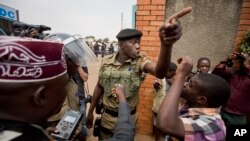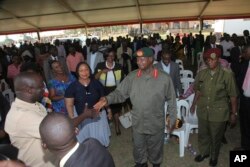Uganda’s new police bosses have been given a big job — rebuild public confidence in an institution that has seen its image damaged by soaring crime.
Unsolved murders, including those of a police boss, a state prosecutor, Muslim clerics and women; attacks on residents, robberies and the recent killings of foreigners in hotels — that is the crime scene in Uganda. Police corruption compounds the problem.
With public frustration growing, President Yoweri Museveni last week named Okoth Martins Ochola as the inspector-general of police, with Brigadier Sabiiti Muzei as his deputy.
The reshuffle came just a few days after the kidnap and brutal murder of a young woman, whose captors warned her relatives not to call the police. One of the kidnappers was recorded saying we are working with the police and would know if the family sought help.
This was just one of many cases in which police have been implicated in crime. Only a few officers have been held to account for criminal activities. The police also have been seen working with militias and criminal groups during police operations, thus discrediting investigations.
One suspect, Juma Muyirwa confessed before journalists that many criminals work with the police.
He says police in patrol cars protect him and his comrades, and they were taken to a rich man’s house. When they got there, Muyirwa says the police handed us pangas (large knives) and told them to get to work attacking the residents. The police protect them, he says.
President Museveni last week said the police have long been infiltrated by criminals.
With Ochola at the head of the force, many in Uganda now hope for greater security and accountability. He has been on the force 30 years and is seen as a disciplinarian. He also has served as a legal officer, which may indicate more criminal investigations will go through proper procedures.
His new deputy, Brigadier Muzei, comes from the military, where he had been commander of the military police.
Despite the allegations of corruption, police spokesperson Emiliano Kayima says the force provides security for all Ugandans.
“A few incidents that happened, that probably even threatened all of us, they are bad enough. But this is not to say that we are in disarray. In the near future, the new team that comes I am sure will have a road map. And we shall see if there are gaps that have been exploited by this criminality, it will be purged, but we are here to serve.”
However, political analyst Godber Tumushabe says he expects little change.
“I actually don’t think there is a change of guard. I think we are still at exactly the same point. Because, the chief security person in this country is President Museveni," he said. "So, as long as he is the president, commander in chief, I doubt if any of these guys have the ability to transform the security architecture of this country.”
For Ugandans, a new police administration focusing on the state will hopefully be reason enough to restore confidence in the police force.





